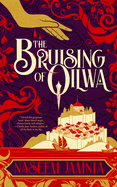
Naseem Jamnia's brilliant and insightful novella, The Bruising of Qilwa, explores questions of identity and belonging in a nuanced medical mystery.
Firuz has relocated to Qilwa with their family to avoid persecution in their homeland as a practitioner of the much-feared Sassanian blood magic. In Qilwa, they find a city unwelcoming to outsiders, with a deep-seated fear and suspicion of Sassanians--particularly any that may be adept at blood magic. Despite the climate, Firuz is fortunate enough to find work as an apprentice healer at a local clinic, where they work alongside healer Kofi as a plague sweeps through the city. When the plague begins to wane, however, Firuz and Kofi start to see startling signs of a new "blood-bruising" disease that leaves healthy people ailing, and cadavers behaving in ways that should be impossible. Unless, as Firuz suspects, the new illness may not be an illness at all, but a side effect of poorly used blood magic--but by whom? And to what end?
Jamnia has built an intricate, multi-layered world full of magic and queerness in The Bruising of Qilwa. While the political worldbuilding can be hard to follow at times, the exact nature of the politics in Qilwa and surrounding areas proves less important than the region's history of subjugation--in both directions. That fact, upon which the current climate of prejudice in Qilwa is built, bleeds into Jamnia's exploration of place and belonging. Dedicated to "the migrants around the world who leave their histories in search of a better future," The Bruising of Qilwa explores the murky and nuanced complexities of migration. --Kerry McHugh, freelance reviewer

